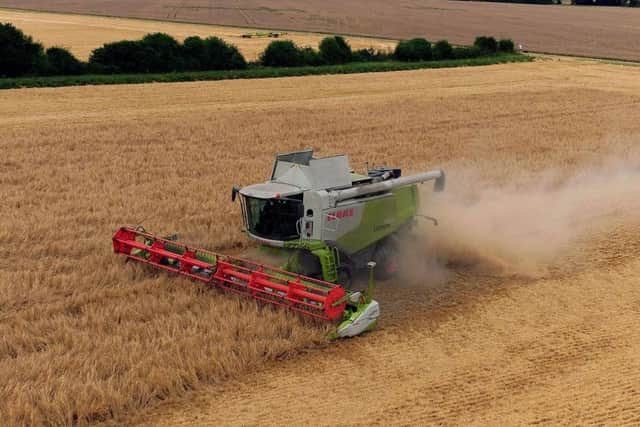The Reporting Back opinion column with Robert Goodwill MP


My studies for an agriculture degree focused not only on the day-to-day, practical aspects of managing a farm, but also on broader challenges affecting our natural environment – and their potential solutions.
I’ve seen first-hand how the EU’s Common Agricultural Policy (CAP) has favoured large conglomerates over the small-scale family farm, incentivised over-supply and inefficiency – remember the grain mountains and milk lakes, and created a culture of dependency on EU handouts.
Advertisement
Hide AdAdvertisement
Hide AdThe current subsidy system of direct payments – which is not linked to public benefits or stewardship of the land for future generations – sees the top 10% of recipients receive almost half the total payments, while the bottom 20% in some of our most marginal areas such as the North Yorkshire Moors, receive just 2%.


This unfairly rewards the largest landowners and discourages new entrants to farming.
With farmland covering nearly three quarters of England, the EU’s jurisdiction over how we grow our food and protect our resources is vast.
A new approach promoting positive action in the countryside, benefiting farmers and the environment both now and into the future, is needed.
Advertisement
Hide AdAdvertisement
Hide AdLast week, the Government announced an ambitious new funding model for agriculture, based on using public money to pay for public goods.
It has recognised that the task of taking care of the world around us for future generations should not be for farmers to bear alone, and I am confident that this new Agriculture Bill will help us not only safeguard and enhance our environment, but also ensure more efficient food production.
I have already signed up my own farm near Malton to the type of project that will be rewarded under the new Bill: providing habitats for British wildlife which have been lost.
Last week, I sowed wild bird seed mixtures so that, in the spring, some of our fields will be ablaze with nectar plants and buzzing with insects once more.
Advertisement
Hide AdAdvertisement
Hide AdThe Agriculture Bill heralds a transition to funding for new technologies for improved environmental benefits, new methods to boost productivity, and new research projects to help the farmers of the future, regardless of farm size.
Advancing these areas is essential to help British agriculture respond positively to the challenges we face surrounding climate change, food security and resource protection.
This should, in turn, lead to a reduction in our environmental footprint – as well as help British farmers become more profitable.
Because as well as rewarding those who take measures to reduce flooding by planting trees or encourage wildlife by maintaining hedgerows, the Bill will also support farmers in getting fair prices for the food they produce, making them more resilient in the long run. Simplifying the vast bureaucracy involved in the CAP will make it easier to access payments, increasing value for money; transitional support schemes will enable investment in equipment, technology and infrastructure, allowing farmers to diversity their activities and become more internationally competitive.
Advertisement
Hide AdAdvertisement
Hide AdThe government will work with farmers to ensure those EU rules which help us are maintained, while those which hinder are scrapped.
As Direct Payments are gradually phased out during the transition period, farmers will have greater flexibility in how they use the money – while continuing to enforce high standards in land management and animal husbandry.
The Agriculture Bill is a positive step forward for UK farmers as the country navigates leaving the CAP.
This new system of public money for public goods can only be a good thing for British farmers and our environment, and will ensure farming plays its part in our pursuit of a Green Brexit.